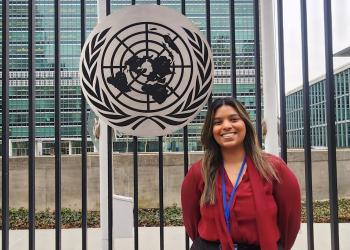View from the Interns: Reflections on the 68th Commission on the Status of Women
By Judy Bissoon
Time and tide wait for no woman, and most certainly, no man (the fight for equality never ends in March).
Coming from my very first Commission on the Status of Women (CSW), I am struck by the fact that it is the 68th session. Sixty-eight sessions and we are still faced with the same foundational issues. Many conversations urged recognition of the historical imbalance between men and women that stagnates the endeavors of the Commission. But, despite the energizing presence of women sharing their stories, I am left questioning the progress which has been inching towards a state of plateau. Many of the calls are met with tenuous implementation. So, how can we transform the CSW space not just for restating the issues, but for catalyzing lasting change while nurturing inclusive spaces?
When I attended the opening session of CSW at the UN, I saw a mother, in the corner cradling her baby, while listening attentively to the remarks given at the opening. I looked, in admiration, at the mother, and thought of the many mothers, and women, taking on the unpaid aspect of family life. I have to strongly acknowledge that care work is critical for our economy and society, but unfortunately, it remains invisible and unsupported. This, thereby, impedes the economic empowerment of women and reinforces an inequitable gender-based allocation of domestic responsibilities. How can men be incentivized to share the responsibilities of care work that have historically disadvantaged women?
Addressing gender equality requires acknowledging the potential for men to contribute positively, while also confronting the persistence of practices rooted in toxic masculinity and its repercussions experienced by both men and women. This acknowledgment does not diminish anyone’s potential as an ally but underscores the necessity for introspection and active participation in dismantling the structures that perpetuate gender disparities. Perhaps my proposal is to create spaces where persistent orthodox narratives about gender roles can be unlearned and start re-conceptualizing how the solution lies within collective efforts.
This also necessitates educating younger men and boys about their role in building a gender-equal society and allowing them to understand and unpack the historical discrimination against women. Drawing from the statement of the BIC to the Commission, the deepest insights can emerge even from the kitchen table in the home on how biased norms and the many habits of patriarchy can start to loosen and make way for new relationships between women and men.
Often overlooked in issues related to gender is the role of mental health. Globally, mental health challenges impact not only women and girls but also men and boys. Very often, these mental challenges stem from patriarchal norms and standards that result in unhealthy gender dynamics. Integration of research and health policies is vital. There must be an accommodation for the psychological support that is needed by men i.e., creating a space where they feel comfortable enough to discuss these issues without the fear of upsetting anyone. Of course, these efforts should not take away spaces for women as well.
Mental healthcare should not just be limited to institutions and work but should also account for men in domestic settings, expanding perspectives on the issue. Attending one of the events during CSW, a male panelist brought up the fact that there has to be something that goes deeper in which men are impacted mentally, and I found some truth to that. Societies must be rooted in sentiments of encouragement and intentionality that can therefore normalize emotional support for men. This can catalyze the prioritization of emotional well-being and allow men to deal with challenges in healthier ways, reducing acts of domestic violence.
We often think that gender equality is something that has an end goal, but I would never say that. I say as society constantly evolves, so too do the challenges it presents. Thus, the imperative lies in constructing sustainable progress capable of addressing the complexities of a globally interconnected world. There is not “an end” to be achieved, but there is a continual path of progress that can lead to transformation for the greater good.
Judy Bissoon is an intern at the Baha’i International Community United Nations Office
